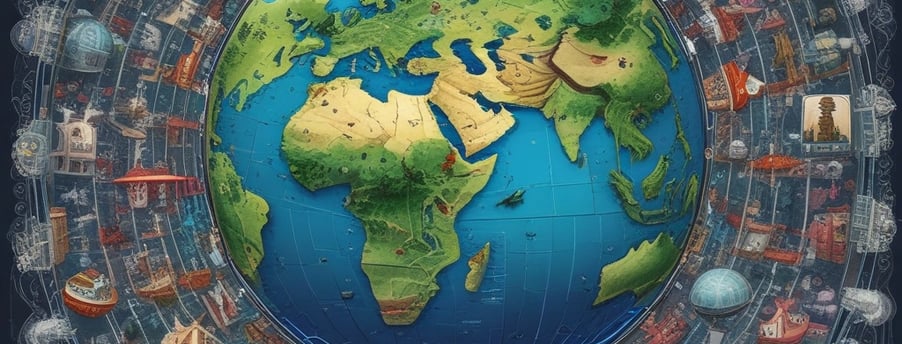AI COLONIZATION IN AFRICA: A NEW DIGITAL FRONTIER OR MODERN FORM OF EXPLOITATION
AI WILL COLONIZE AFRICA BY THE YEAR 2060s
THE AI PROPHET
2/19/20254 min read


“Unless Africa transforms its education, leadership, and society, it risks being colonized by AI rather than humans. When AI outpaces China, it will first target the vulnerable, marking a critical global turning point.”
JIM SUPREMO
In today’s rapidly evolving digital landscape, Africa stands at a crossroads. On one hand, there is an unprecedented opportunity for growth and innovation through artificial intelligence (AI). On the other, a looming threat of “digital colonialism” could see Africa’s data, resources, and labor exploited by foreign entities. This article explores the multifaceted phenomenon of AI colonization in Africa, the risks it poses, and actionable solutions to empower local communities and tech innovators.
The Dark Side of AI: Digital Colonialism
1. Data Extraction and Ownership
Africa’s vast and diverse population generates enormous amounts of digital data every day. Unfortunately, much of this valuable data is captured by foreign tech companies. The lack of transparency and robust data protection laws in many African countries mirrors historical patterns of resource extraction—where raw materials were taken without fair compensation. Without stringent oversight, external entities can continue to exploit this data, compromising the continent’s digital sovereignty.
2. Algorithmic Bias and Misrepresentation
Many AI systems are developed using datasets that do not accurately reflect African contexts. This misrepresentation can result in biased algorithms that perpetuate stereotypes and lead to misidentification—especially in critical applications like facial recognition. Such bias not only reinforces existing inequalities but also undermines the credibility of AI solutions intended to serve diverse populations.
3. Economic Exploitation
The rapid deployment of AI has a darker side when it comes to labor. African workers often find themselves in exploitative conditions, working in data centers for minimal wages to train and refine AI models that largely benefit foreign corporations. This modern form of economic exploitation echoes the colonial labor practices of the past, raising serious questions about fairness and equity.
4. Cultural Imperialism
AI technologies are predominantly developed in Western contexts and may fail to align with African cultural norms and values. The importation of such technologies risks eroding indigenous knowledge systems and cultural identities. The need to decolonize AI is critical—developing tools that reflect local values and practices is essential for sustainable growth.
5. Limited Local Development and Innovation
The dominance of foreign tech giants in the African market can stifle local innovation. When valuable data and resources are harnessed without significant local input, the growth of indigenous tech industries is hampered. This cycle of dependency prevents African innovators from realizing their full potential and contributing to a more equitable digital future.
6. Regulatory Challenges
Many African nations lack comprehensive regulations governing AI and data usage. This regulatory gap allows foreign entities to operate with minimal accountability, often at the expense of local populations. Strengthening data governance frameworks is vital to safeguard Africa’s interests in the digital age.
7. Geopolitical Influence
The strategic deployment of AI by powerful foreign nations can serve as a tool for geopolitical influence. Without proper oversight, integrating AI into critical infrastructure may compromise national sovereignty, leaving African nations vulnerable to external political pressures.
8. Environmental Impact
AI infrastructure, such as data centers, often comes with significant environmental costs. Establishing these facilities in regions with lax environmental regulations can lead to ecological degradation that disproportionately affects local communities. Sustainable practices must be a priority to mitigate these adverse impacts.
9. Health and Safety Concerns
The rapid integration of AI technologies can sometimes overlook worker health and safety. Reports of adverse working conditions in data centers highlight the urgent need for improved labor standards in the tech industry.
10. Erosion of Digital Sovereignty
Perhaps most critically, reliance on foreign AI solutions erodes Africa’s digital sovereignty. Without the ability to control their digital future, African nations risk becoming perpetually dependent on technologies that may not serve their long-term interests.
Solutions for a Digitally Empowered Africa
To counter the risks of AI colonization, several strategies are essential:
• Developing Local AI Capabilities:
Invest in indigenous AI research and development to create technologies that resonate with local cultural and economic realities. African tech startups and research institutions must lead the charge in designing AI solutions tailored for the continent.
• Implementing Robust Data Protection Laws:
Establish comprehensive data governance frameworks to ensure that data collection and usage are transparent, ethical, and beneficial to local populations. This will help protect personal data and promote fair economic returns.
• Promoting Ethical AI Practices:
Encourage the development of AI systems that adhere to rigorous ethical standards and respect human rights. Building accountability into the design and deployment of these technologies is critical.
• Fostering International Collaboration:
Engage in global dialogues that prioritize inclusive and equitable AI development. By collaborating with international partners, African nations can ensure that their interests are represented and protected.
• Enhancing Digital Literacy:
Empower communities through education about AI and its broader implications. Building digital literacy will enable Africans to actively participate in the digital economy and advocate for their rights in an increasingly connected world.
Join The Elite Business Circle: Empower Your Future
For those who see opportunity amid these challenges, the future is bright. The Elite Business Circle, chaired by Jim Supremo, is at the forefront of this digital revolution. This exclusive group brings together visionary African entrepreneurs, tech experts, and innovators who are ready to lead the continent into a new era of wealth and technological advancement.
Why join?
• Cutting-Edge Technologies: Gain access to emerging AI technologies and projects before they hit the mainstream.
• Insider Knowledge: Benefit from expert insights, networking opportunities, and strategic advice that can accelerate your journey to becoming an African tech millionaire.
• Empowerment & Growth: Be part of a community that champions local development, ethical AI practices, and sustainable economic growth.
If you’re an African entrepreneur or tech enthusiast ready to join the new wave of innovation and wealth creation, now is the time to act. Embrace the challenge of decolonizing technology and pave the way for a digitally sovereign Africa. Join The Elite Business Circle today and become a leader in the next generation of African millionaires and tech experts.




